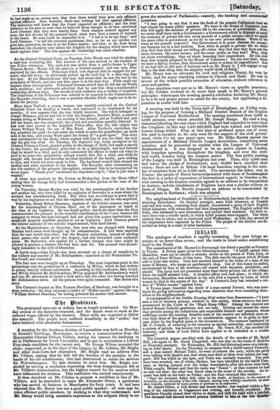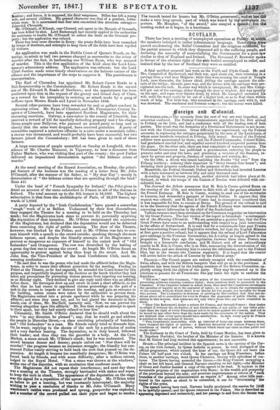IRELAND.
The catalogue of murders is rapidly increasing. One post brings ac- counts of no fewer than seven; and the trade in blood seems establishing itself in the North. The assassination of Mr. Hassard in Fermanagh has found a parallel at Pomeroy in Tyrone. A Newry paper gives the following account. "A bailiff, named John Heazelton, went out to execute a sessions decree on the person of Felix Linn, at the suit of Peter M'Gone, of this town. The debt was for two guns which M'Gone sold to Linn last winter. Linn had secreted himself in the house of a man of the name of Mooney, who keeps an apothecary's shop. Out of this house he sallied, accompanied by four of his brothers—all armed with bayonets, pitchforks, and pistols. The party had not proceeded more than thirty perches out of the village, when the bailiff arrested Linn. A dreadful affray now took place; in which, un- fortunately, Heazelton was stabbed in the side with a bayonet by Linn, of which wound he died in the course of the day." A Coroner's Jury has returned a ver- dict of " Wilful murder" against Linn. A Tyrone paper describes the death of a man named Forrest, who was mur- dered for giving information regarding some deserters that were concealing them- selves in his neighbourhood.
A correspondent of the Dublin Evening Mail writes from Roscommon—" I have seen a list of fourteen persons, resident in this county, whose sentence has been pronounced by the Court of the `Black Sheep Office. Among the doomed are several Roman Catholic gentlemen and one lady. Nothing can exceed the alarm that prevails among the industrious and respectable farmers and peasants, whose sufferings under the existing dreadful state of the country are infinitely more se- vere than those of the gentry; yet no consideration appears to be given to their case either by the English press or the Government. The measure instituted by Mr. F. French, of swearing in the tenantry as special constables, and instituting a system of patrols, has become very popular. Mr. Grace, M.P., has enrolled his tenantry; and those of Lord Dillon have applied to be embodied in a similar manner." The Limerick papers are filled with the details of the murder of Mr. Ralph Hill, sub-agent to Mr. David Fitzgerald, who was shot on the lands of Rathnre on Thursday sennight. On Wednesday, Mr. Hill had distrained some corn belong- ing to John Quoin. On the Thursday, in company with a bailiff named Flannery, and a man named Michael Tobin, he went to remove the corn; while the party were talking with Quoin's son, four shots were fired at them from behind the hag- gard: Hill was killed on the spot, and Tobin was mortally wounded. Two men have been arrested, one of whom, Skehan, has been identified by the bailiff Flan- nery, as having jumped over the hedge immediately after the shots were fired. When caught, Skehan said that his name was "Keane "; at that moment he had on only one shoe; the other was found close to the scene of the murder. An in- quest was held on the body on Friday, and the Jury returned this verdict— "That the deceased, Ralph Hill, came by his death, at Rathure, in the county of Limerick, on the morning of the 18th Instant, having been wilfUlly murdered, by gun. shot wounds, Indicted by some person or persons to us unknown." Mr. Daniel Dillon, a rich farmer and money-lender, was waylaid within a fur- long of his residence at Cappamore last evening, and brutally murdered. His assailants literally atoned their victim to death, and cleft his head with a hatchet. , The deceased had decreed several persons indebted to him at the late Quarter. ,Session,; and hence, it is supposed, the fatal vengeance. Dillon has left a young wife, and several children. His general character was that of a prudent, indus- trious man.- It is ascertained that four men committed this atrocious outrage.— Limerick Chronicle.
Mr. O'Donnell, of Kilcash, near Clonmel, sub-agent to the Marquis of Ormonde, has been killed byshot. Lord Besborough had recently applied to the authorities for assistance to enable Mr. O'Donnell to collect the rents on the Ormonde pro- perty; but the application was refused. There has been some disorder in Kerry: the potato fields have been ransacked . by troops of destitute, and attempts to keep them off the fields have been repelled by violence.
An application was made in the Dublin Court of Queen's Bench, on Sa- turday, to admit to bail two persons charged as accessories to the crime of murder after the fact, in harbouring one William Ryan, who was accused of murder. This is the first application of the kind since the Lord-Lieu- tenant's admonitory address. The application was refused; but the Lord Chief Justice made some timely observations on the heinous nature of the offence and the importance of the steps to suppress it. The punishment is transportation.
The Earl of Clarendon has appointed Mr. Robert Carew Reade to a Sub-Inspectorship in the Constabulary. Mr. Robert Reade is the second son of Mr. Edward B. Reade of Newlawn ; and the appointment has been conferred upon him at the request of the gentry and Grand Jury of Clare, as a reward for his intrepidity in resisting an attack made by a gang of ruffians upon Messrs. Reade and Lynel in November 1846.
Several other persons have been rewarded for zeal or gallant conduct in repressing crime. Mr. Ryan, of Clonmel, and Mr. Fitzmaurice, County In- spector of Limerick, have been appointed Resident Magistrates, for their unceasing exertions. Galway, a care-taker in the county of Limerick, has received a reward of 151. for manfully defending property under his charge. Seven people near Ballyvoe, who pursued an armed party so long and so closely that the arms were dropped, have received gratuities. A party of constables captured a notorious offender in a cave under a mountain cabin; a rescue was threatened, and would probably have been successful, but two .farmers joined the Constabulary: 201. has been given to each of those farmers.
A large concourse of people assembled on Sunday at Longhold, the re- sidence of Mr. Charles Bianconi, in Tipperary, to hear a discourse from Father Mathew, who was visiting that part of the county: the good Father -delivered an impassioned denunciation against " the hideous crime of murder."
At the usual meeting of the Repeal Association, on Monday, the princi- pal feature of the business was the reading of a letter from Mr. John O'Connell, after the manner of his father, to " My dear Ray "; mostly in .denunciation of " the hideous crimes that are spreading through the land." Rent 411.
Under the head of " French Sympathy for Ireland," the Pilot gives in detail an account of the sums subscribed in France in aid of the distress in Ireland. The total amount up to the 8th instant is 16,1001. The highest subscription is that from the archbishopric of Paris, of 26,219 francs, up- wards of 1,0501.
A party deputed by the " Irish Confederation " have passed a somewhat ' rough " week of it at Belfast. Undaunted by their first discomfiture,
they engaged the Theatre for a meeting to be held on the Thursday last week; but the Magistrates took steps to prevent it; personally apprizing the deputation of that intention. Mr. O'Brien reciprocated the courtesies of the Magistrates, but declared that the deputation would not be debarred from exercising the right of public meeting. The door of the Theatre, .however, was blocked by the Police; and so Mr. O'Brien was fain to con- tent himself with a speech to the crowd outside; speaking through the most +hideous uproar, and despite the friendly attempts of the Magistrates to prevent so dangerous an exposure of himself to the united mob of " Old Irelanders " and Orangemen. The row was diversified by the baiting of a great dog that ran in among the crowd. At length Mr. O'Brien found an opportunity to protest against being thus kept in the street. And Mr. John Rea, the Vice-President of the local Confederate Club, made an amusing confession—
"He said that he was the person who had made the affidavit before the Magis- trates, in order to insure their efficient protection for the meeting. Finding no Police at the Theatre, as he had expected, he attended the Court-house for this purpose, and respectfully inquired of the Justices on the bench whether they had taken any precautions for preventing riotous persons from impeding our meeting, as on Monday night. They declined to give any reply until there was an affidaeit before them. He thereupon drew up and swore in court a short affidavit, to the effect that he had reason to apprehend riotous proceedings on the part of a mob in the streets to impede or obstruct the meeting, and gain an entrance to the building, unless means were taken' by the authorities to prevent them. The Magistrates retired into a private apartment while he was preparing his affidavit; and when they came out and he had placed the document in their hands, one of them, Mr. MacNeill, instantly said, ' Now, we can prevent the meeting altogether upon this affidavit.' Mr. Rea then made an attempt to speak to them again, but they had utterly refused to hear him." Ultimately, Mr. Smith O'Brien declared that he should walk about the town " in any direction he pleased"; nay, that he would go and address the people in Hercules Street,—a class consisting principally of butchers, and " Old Irelanders" to a man. His friends vainly tried to dissuade him. On he went; replying to the shouts of the mob by a profusion of smiles and a very fearless bearing. The deputation, as in duty bound, followed their leader; and thus they ran the gauntlet in a body. At the Corn Market, a stone struck Mr. O'Brien's cheek; but he was undaunted. The crowd became denser and denser; people called out "Now there will be murder!" the progress became an incessant struggle; the friendly but con- temned Police vainly striving to hold back the mob that pressed on the de. Putation. At length it became too manifestly dangerous; Mr. O'Brien was forced back by friends, and with some difficulty, after a tedious retreat, lodged in the Royal HoteL " Not a stone was thrown at the windows," writes one of the deputies, with an exultation that confesses much. The Magistrates did not repeat their interference; and next day there Was a meeting at the Theatre, strongly barricaded with stakes and ropes, to keep the mob in check. The appearance of the deputation on the stage was the signal for a repetition of the uproar of Monday. Mr. O'Brien tried as before to get a hearing, but was constantly interrupted; the majority wishing to pass a resolution of thanks to Mr. John O'ConnelL Many watchmen's rattles were produced and sprung, gunpowder was exploded, and a number of the crowd pulled out their pipes and began to smoke. The tumult lasted for hoursi but Mr. O'Brien persevered; and at last did make a very long speech, part of which was heard by • 'newspaper re- porters. Mr. Meagher, "of the sword," also essayed a - h; but the meeting ended as it began, in a hurricane.



























 Previous page
Previous page